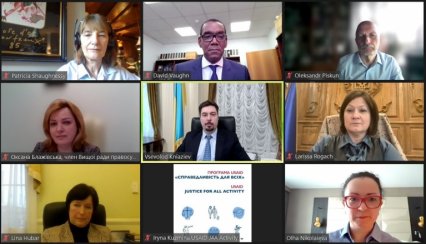Contact center of the Ukrainian Judiciary 044 207-35-46

After the Victory, the Ukrainian economy will require significant domestic and foreign investment. These investments are possible, among other things, provided that fair business is properly protected.
This was stated by Vsevolod Kniaziev, President of the Supreme Court, during an online meeting with representatives of the USAID Justice for All Program (the Program). The discussion focused on improving the system of regulation of commercial disputes in Ukraine, as well as on the prospects for establishing a specialized court for investment disputes in Ukraine.
The participants of the meeting included Larysa Rohach, President of the Commercial Cassation Court within the Supreme Court, Oksana Blazhivska, Member of the High Council of Justice, Patricia Shaughnessy, Professor and Commercial Dispute Resolution Expert of the Program, David Vaughn, Justice for All Program Chief of Party, Olha Nikolaieva, Program Legal Advisor, Oleksandr Piskun, Democracy Project Manager on Development of Democracy and Governance at the USAID Democracy and Governance Division in Ukraine, and Lina Hubar, Head of the Division for International and Legal Cooperation of the Supreme Court.
Vsevolod Kniaziev thanked the Program for the conducted research, which was based on a survey of Ukrainian and international businesses operating in Ukraine on their attitudes and needs in commercial dispute resolution. The survey respondents generally gave a positive assessment of the proceedings of commercial courts. However, there are some complaints about the timeframes for consideration, but it is the commercial courts of Ukraine that are the most adherent to the timeframes for case consideration, and it makes the system of commercial courts distinct in terms of quality. Prompt resolution of commercial disputes is a key to business development and the sustainability of the country's economy.
He pointed out that there were several points of view on the model of investor protection: specialization of commercial courts to consider investment disputes; establishment of a special chamber on the basis of the High Court on Intellectual Property to consider investment cases; strengthening arbitration resolution of such disputes.
"We are launching discussions on this issue to determine the best way forward. At the same time, one thing is absolutely clear: whatever option is chosen for investment dispute resolution it must enjoy the trust of national and foreign investors," Vsevolod Kniaziev is convinced. To begin with, he believes that we need to analyze the best international practices, find the most appropriate option for Ukraine, adapt it to our needs, and implement it in the national legal framework.
President of the Commercial Cassation Court within the Supreme Court Larysa Rohach emphasized the importance of introducing a model of investment dispute resolution that would guarantee a prompt resolution and ensure quality proceedings. To this end, it is also necessary to regulate the rules that determine the basis for the activities of business entities (customs, tax procedures, investment conditions, etc.). The rules of conduct should be clear and easy for investors to understand. In addition, improving the investment climate is impossible without improving procedural legislation.
The speaker cited some figures. In 2021, the average period of time for a commercial case to be considered (from the time of filing a complaint to the time of the cassation court decision) was 210 days, with the average period of time for a case to be considered by the first instance and the appellate court being 156 days. In 2022, the period of time for the case to be considered by the commercial court slightly increased for objective reasons.
Larysa Rohach said that businesses began to use mediation more actively to resolve disputes. In 2021, commercial courts issued 23 rulings on dispute resolution through mediation, and in 2022 there were 765 such rulings. In 2021, courts handled 753 cases involving a foreign element, and in 2022 - 244.
Before starting to improve the judiciary, the President of the SC Commercial Cassation Court emphasized that the concept of investment should be updated, since the investment legislation adopted in the 1990s did not meet modern needs.
Larysa Rohach is convinced that, given the timeframe for consideration of cases by commercial courts and the number of judges in these courts, commercial jurisdiction can ensure timely and efficient consideration of disputes with a foreign entity. At the same time, introducing point changes to the legislation will help to achieve even greater procedural economy. For example, by expanding the institute of written proceedings in the cassation instance (commercial jurisdiction considers approximately 90% of cases in a court hearing with the parties summoned) and expanding the cases for which expedited proceedings can be applied.
During her speech, Patricia Shaughnessy said that she was impressed with how much the Ukrainian judiciary was doing to restore the country and improve the investment climate. According to her, the Program has developed a lot of materials on strengthening judicial and extrajudicial mechanisms. The expert is convinced that the results obtained should be reviewed and future work should be prioritized in view of the ongoing aggression and the current needs of the Ukrainian judiciary.
David Vaughn assured of further support of the Ukrainian judiciary, especially in terms of protecting international and domestic investors. In particular, the Program can provide expert analysis of any developments for future initiatives, projects, or events. A wide range of international experts who can present their best practices will provide high-quality expertise.
Concluding the meeting, Vsevolod Kniaziev thanked the Program for supporting all areas of judicial system development and reform and expressed his hope that fruitful cooperation aimed at developing the most effective model of investor protection and improving legal regulation with expert assistance would continue.